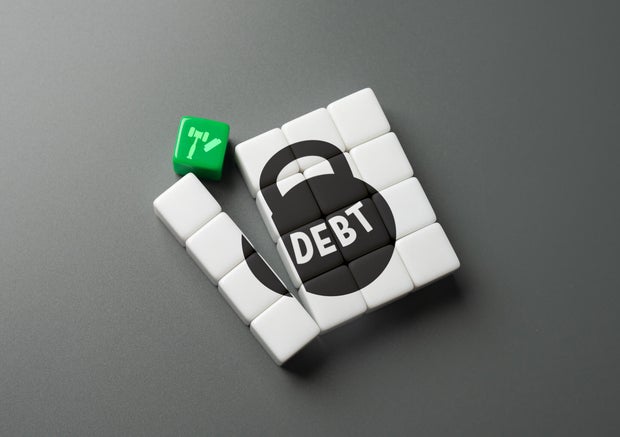 Knowing what not to do is just as important as knowing what to do when it comes to paying off debt.
Andrii Yalanskyi/Getty Images
Knowing what not to do is just as important as knowing what to do when it comes to paying off debt.
Andrii Yalanskyi/Getty Images
Debt levels in the U.S. are climbing higher than ever, and the strain is being felt across millions of households. Borrowers are carrying larger balances overall in terms of their debt loads, and credit card debt has been rising steadily alongside other types of consumer borrowing. That means more Americans are juggling a lot of high-rate debt at a time when the average credit card interest rate remains near record highs, making even modest balances costly to carry.
Faced with these realities, many people are working hard to pay down their debt balances. But here's the thing about debt payoff: Good intentions aren't enough. Even the most motivated borrowers can sabotage their progress by making critical mistakes that extend their repayment timeline by months or even years. While the average American spends some of their income each month on debt payments, many are also unknowingly choosing strategies that work against them rather than for them.
As a result, understanding what not to do is often just as important as knowing what you should do when it comes to paying off your debt.
Explore your debt relief options to find the right fit now.
What not to do when paying off debt
Paying off debt takes persistence and planning, but the wrong moves can leave you stuck or even make matters worse. Here are some of the biggest pitfalls to avoid:
Only making minimum payments
Paying just the minimum due each month might feel like progress, but it barely dents your balance. On a $10,000 credit card debt at 22% APR, paying only the minimum could keep you in debt for years and cost thousands in interest.
Instead of taking the minimum debt approach, it makes more sense to pay more than the required amount whenever possible. That doesn't have to be a hefty increase, either. Adding just an extra $25 to your monthly payment can cut years off your payoff timeline, so try to find room in your budget to increase your payments to at least slightly above the bare minimum.
Learn more about how the right debt relief company could help you now.
Taking on new debt while paying off old balances
It's easy to feel like you've earned a little financial breathing room after making progress on your balances. But running up any amount of new debt, whether on credit cards, personal loans or buy now, pay later programs, can erase your gains quickly. This cycle keeps balances high and interest costs mounting. Before celebrating with new spending, you should make sure your debt-reduction plan is firmly on track.
Ignoring available help
Many borrowers overlook the professional resources that can help lighten the load, even when they're struggling to afford their debt payments. That's a big misstep, because resources like credit counseling agencies or debt relief companies can be smart tools to incorporate when you need some extra help. For example, a credit counselor can assist with creating a debt management plan that could lower your interest rates. In other cases, a balance transfer credit card with a 0% introductory APR offer will provide meaningful relief. Or, a debt relief company could also help you settle your debt for less than the full balance if you're unable to afford what's owed. You have lots of options, but ignoring these tools can leave you paying more than you need to.
Draining your emergency fund to pay down debt
It might seem smart to throw every available dollar at your debt balances, but wiping out your savings to do so can leave you financially vulnerable. If an unexpected expense arises, you may end up relying on credit cards or other types of borrowing again, undoing your progress. That's why a balanced approach is often best. You continue paying down debt aggressively, but keep some emergency funds on hand to avoid setbacks.
Failing to adjust your spending habits
Debt repayment isn't just about how much you pay; it's also about changing the behaviors that led to borrowing in the first place. If you don't adjust your spending, whether that means dining out less, trimming subscriptions or finding ways to boost income, you risk falling back into old patterns. Without changes to these habits, even a cleared debt balance could creep back up again.
Waiting too long to act
Perhaps the most damaging misstep, though, is simply delaying action. Interest compounds quickly on revolving debt, especially at today's rates, and the longer you wait, the more expensive your debt becomes. If you can't pay it all off immediately, just starting with small, consistent steps now can save you thousands over time.
The bottom line
Paying off debt can feel like an impossible task, but avoiding the more common missteps can make the process smoother and more effective. So, whenever possible, steer clear of making just the minimum payments, resist the temptation to add new debt and don't ignore the help and resources that can assist you along the way. It's also important to remember that while debt repayment takes discipline, the process doesn't require perfection. You simply need to make steady improvements and stay committed to ensure that you're headed down the right track.
Angelica Leicht is the senior editor for the Managing Your Money section for CBSNews.com, where she writes and edits articles on a range of personal finance topics. Angelica previously held editing roles at The Simple Dollar, Interest, HousingWire and other financial publications.


















































